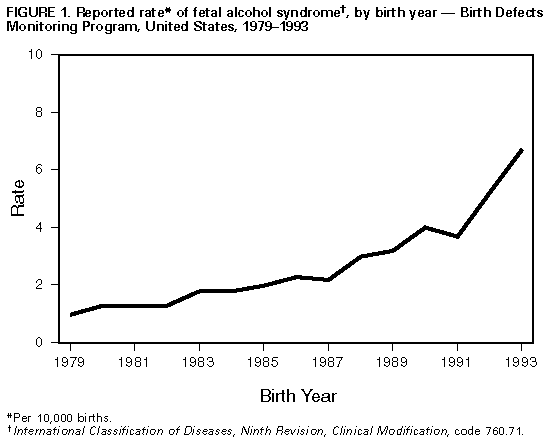 |
|
|
|
|
|
|
| ||||||||||
|
|
|
|
|
|
|
||||
| ||||||||||
|
|
|
|
|
Persons using assistive technology might not be able to fully access information in this file. For assistance, please send e-mail to: mmwrq@cdc.gov. Type 508 Accommodation and the title of the report in the subject line of e-mail. Update: Trends in Fetal Alcohol Syndrome -- United States, 1979-1993Fetal alcohol syndrome (FAS) is characterized by a variety of physical and behavioral traits that result from maternal alcohol consumption during pregnancy. Features of FAS include prenatal or postnatal growth deficiency, characteristic abnormal facial features, and central nervous system deficits (1). Based on data from the national Birth Defects Monitoring Program (BDMP) (2), the rate of reported cases of FAS identified among newborns in the United States during 1979-1992 increased approximately fourfold (2). This report updates data characterizing the occurrence of FAS through 1993, the latest complete year of data reporting for BDMP. BDMP data are abstracted from hospital discharge data of newborns provided voluntarily by nonfederal, short-term stay hospitals. FAS cases were identified based on coded hospital discharge diagnoses (International Classification of Diseases, Ninth Revision, Clinical Modification {ICD-9-CM}, code 760.71, "Noxious influences affecting fetus via placenta or breast milk, specifically alcohol; includes fetal alcohol syndrome"). However, this code is not specific for FAS and may reflect maternal alcohol consumption during pregnancy or other adverse effects of alcohol on the fetus. During 1993, the BDMP monitored data on approximately 5% of all births, compared with approximately 30% in 1979. In 1993, FAS was reported in 126 of 188,905 newborns (rate: 6.7 per 10,000) Figure_1. Overall, during 1979-1993, FAS was reported in 2032 of 9,434,560 newborns (overall rate: 2.2 per 10,000 births). The rate for 1993 was more than sixfold higher than that for 1979 (1.0 per 10,000 births). Reported by: Birth Defects and Genetic Diseases Br, Div of Birth Defects and Developmental Disabilities, National Center for Environmental Health, CDC. Editorial NoteEditorial Note: Although the cause of FAS -- alcohol consumption during pregnancy -- is preventable, the findings in this report suggest an increasing frequency of this problem. This increase may reflect a true increase in the number of infants with FAS -- the most severe expression of in utero alcohol damage to the fetus -- or an increase in the awareness and diagnosis by primary-care clinicians of FAS in newborns. Although ICD-9-CM code 760.71 is not specific for FAS, it has been used in this analysis because it may reflect a maternal history of alcohol consumption during pregnancy; the diagnosis or suspicion of FAS or its less severe manifestation (fetal alcohol effect); or other alcohol-related birth abnormalities. After the newborn period, this code also may be assigned to children for whom diminished cognitive function or behavioral problems are believed to be associated with maternal alcohol consumption during pregnancy -- particularly in older children in whom developmental and neurobehavioral abnormalities are more readily diagnosed. Studies are under way to better characterize the magnitude of FAS, particularly among population subgroups at increased risk for alcohol consumption during pregnancy and for having an infant with FAS. These studies may enable public health officials to more effectively target FAS prevention and alcohol consumption intervention efforts. References
Figure_1  Return to top. Disclaimer All MMWR HTML versions of articles are electronic conversions from ASCII text into HTML. This conversion may have resulted in character translation or format errors in the HTML version. Users should not rely on this HTML document, but are referred to the electronic PDF version and/or the original MMWR paper copy for the official text, figures, and tables. An original paper copy of this issue can be obtained from the Superintendent of Documents, U.S. Government Printing Office (GPO), Washington, DC 20402-9371; telephone: (202) 512-1800. Contact GPO for current prices. **Questions or messages regarding errors in formatting should be addressed to mmwrq@cdc.gov.Page converted: 09/19/98 |
|||||||||
This page last reviewed 5/2/01
|